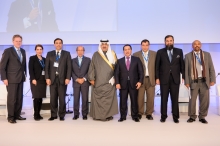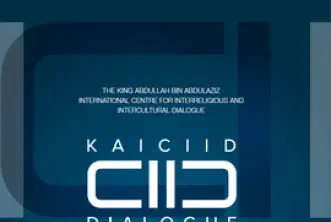The Image of the Other in Education

Interreligious and intercultural education means learning about the faiths and cultures of others, including through dialogue and exchange. It takes place in many forms across the globe, as part of disciplines including citizenship education, peace and values education, social studies and history. It occurs in confessional and non-confessional contexts, in formal and non-formal education. It builds intercultural competencies, preventing stereotypes and discrimination.
The current culturally diverse models of interreligious education have the power to support social cohesion and peaceful coexistence. KAICIID’s work in this field draws upon a rare and specialized expertise base in interreligious and intercultural dialogue training and skills as a pillar of lifelong learning.
KAICIID’s Image of the Other Programme began with a focus on building accurate representation of religious and cultural diversity through interreligious and intercultural education. KAICIID connects researchers, practitioners, educators and policymakers to each other to share case studies and methods successfully used in intercultural and interreligious education in all world regions to promote diversity. The programme supports the exchange of ideas and approaches, serving as a platform for public outreach, sharing best practices, ideas and materials trans-regionally.
In the first year of the programme, KAICIID held four regional conferences to survey practitioners and gather best practices and recommendations that were then presented at the KAICIID Global Forum in November 2013. In 2014, a programme was developed that implemented these recommendations, featuring three distinct approaches:
The Practical Strand includes the development of an online resource prototype and tool kit for curriculum development and self-assessment, teacher training and student assessment to bridge the gap between existing international standards and practical needs in different world regions. More specifically, the tool includes goal-setting, professional development for educators and assessment tools for students, including online tools that will be applicable in various countries.
The Intellectual Strand covers the generation of knowledge and the sharing of diverse practical and policy approaches with interreligious education institutions worldwide. KAICIID is the guest editor for a special issue of the journal International Review of Education (IRE) focusing on interreligious education. The journal is distributed in over 3000 academic institutions.
The Policy Strand includes the maintenance of a network of education experts and governmental focal points, to enable them to share and develop policy practice in interreligious education. This strand includes a number of ongoing meeting and conferences in the framework of the KAICIID Policy Network.
KAICIID POLICY NETWORK
A direct result of the recommendations from KAICIID’s 2013 Image of the Other in Education programme, the KAICIID Policy Network (KPN) is a platform for experts and governmental focal points (education, religious affairs and integration ministries) to discuss interreligious and intercultural education in formal and non-formal education. The focus includes interreligious education, curriculum development and evaluation tools, teacher training and new e-learning resources.
The first of its kind, the KPN is designed to fill a gap by supporting education policymakers, curriculum developers, supervisors and evaluators in their efforts to promote accurate representations of which supports and cross-cultural understanding. The network provides sustained dialogue and information sharing; peer advising and technical assistance; professional development and maintenance of professional relationships among network members.
Through private working meetings, policymakers and education experts from international organizations and academia share information, build institutional memory and expertise, enhance communication and better increase awareness and understanding of different types of approaches in and across diverse national contexts. The KPN is a cross-border community committed to interreligious and intercultural education.
![UNESCO Textbooks [file:field-file-image-alt-text]](/sites/default/files/styles/project_image/public/dsc_7445_1.jpg.webp?itok=Q4vL9Btx)

![The Secretary General of KAICIID speaks at ISESCO meeting [file:field-file-image-alt-text]](/sites/default/files/styles/project_image/public/isesco.jpg_1.jpg.webp?itok=fXxcZhxg)

![[file:field-file-image-alt-text]](/sites/default/files/styles/project_image/public/cover_regional_conference_europe.jpg.webp?itok=--sATwJ8)
![[file:field-file-image-alt-text]](/sites/default/files/styles/project_image/public/cover_regional_conference_asia.jpg.webp?itok=KbbR8Duj)
![KAICIID Global Forum on Interreligious and Intercultural Education, November 2013, Vienna, Austria. Photo: KAICIID [file:field-file-image-alt-text]](/sites/default/files/dsc_7001_0.jpg)
![KAICIID Global Forum on Interreligious and Intercultural Education, November 2013, Vienna, Austria. Photo: KAICIID [file:field-file-image-alt-text]](/sites/default/files/dsc_7002.jpg)
![KAICIID Global Forum on Interreligious and Intercultural Education, November 2013, Vienna, Austria. Photo: KAICIID [file:field-file-image-alt-text]](/sites/default/files/dsc_7084.jpg)
![KAICIID Global Forum on Interreligious and Intercultural Education, November 2013, Vienna, Austria. Photo: KAICIID [file:field-file-image-alt-text]](/sites/default/files/dsc_7095.jpg)
![KAICIID Global Forum on Interreligious and Intercultural Education, November 2013, Vienna, Austria. Photo: KAICIID [file:field-file-image-alt-text]](/sites/default/files/dsc_7115.jpg)
![KAICIID Global Forum on Interreligious and Intercultural Education, November 2013, Vienna, Austria. Photo: KAICIID [file:field-file-image-alt-text]](/sites/default/files/dsc_7117.jpg)
![KAICIID Global Forum on Interreligious and Intercultural Education, November 2013, Vienna, Austria. Photo: KAICIID [file:field-file-image-alt-text]](/sites/default/files/dsc_7130.jpg)
![KAICIID Global Forum on Interreligious and Intercultural Education, November 2013, Vienna, Austria. Photo: KAICIID [file:field-file-image-alt-text]](/sites/default/files/dsc_7204.jpg)
![KAICIID Global Forum on Interreligious and Intercultural Education, November 2013, Vienna, Austria. Photo: KAICIID [file:field-file-image-alt-text]](/sites/default/files/dsc_7213.jpg)
![KAICIID Global Forum on Interreligious and Intercultural Education, November 2013, Vienna, Austria. Photo: KAICIID [file:field-file-image-alt-text]](/sites/default/files/dsc_7224.jpg)
![KAICIID Global Forum on Interreligious and Intercultural Education, November 2013, Vienna, Austria. Photo: KAICIID [file:field-file-image-alt-text]](/sites/default/files/dsc_7227.jpg)
![KAICIID Global Forum on Interreligious and Intercultural Education, November 2013, Vienna, Austria. Photo: KAICIID [file:field-file-image-alt-text]](/sites/default/files/dsc_7227_0.jpg)
![KAICIID Global Forum on Interreligious and Intercultural Education, November 2013, Vienna, Austria. Photo: KAICIID [file:field-file-image-alt-text]](/sites/default/files/dsc_7315.jpg)
![KAICIID Global Forum on Interreligious and Intercultural Education, November 2013, Vienna, Austria. Photo: KAICIID [file:field-file-image-alt-text]](/sites/default/files/dsc_7322.jpg)
![KAICIID Global Forum on Interreligious and Intercultural Education, November 2013, Vienna, Austria. Photo: KAICIID [file:field-file-image-alt-text]](/sites/default/files/dsc_7462.jpg)
![KAICIID Global Forum on Interreligious and Intercultural Education, November 2013, Vienna, Austria. Photo: KAICIID [file:field-file-image-alt-text]](/sites/default/files/dsc_4694.jpg)
![KAICIID Global Forum on Interreligious and Intercultural Education, November 2013, Vienna, Austria. Photo: KAICIID [file:field-file-image-alt-text]](/sites/default/files/dsc_4733.jpg)
![KAICIID Global Forum on Interreligious and Intercultural Education, November 2013, Vienna, Austria. Photo: KAICIID [file:field-file-image-alt-text]](/sites/default/files/dsc_4756.jpg)
![KAICIID Global Forum on Interreligious and Intercultural Education, November 2013, Vienna, Austria. Photo: KAICIID [file:field-file-image-alt-text]](/sites/default/files/dsc_4764.jpg)
![KAICIID Global Forum on Interreligious and Intercultural Education, November 2013, Vienna, Austria. Photo: KAICIID [file:field-file-image-alt-text]](/sites/default/files/dsc_4783.jpg)
![KAICIID Global Forum on Interreligious and Intercultural Education, November 2013, Vienna, Austria. Photo: KAICIID [file:field-file-image-alt-text]](/sites/default/files/dsc_4798.jpg)
![KAICIID Global Forum on Interreligious and Intercultural Education, November 2013, Vienna, Austria. Photo: KAICIID [file:field-file-image-alt-text]](/sites/default/files/dsc_4800.jpg)
![KAICIID Global Forum on Interreligious and Intercultural Education, November 2013, Vienna, Austria. Photo: KAICIID [file:field-file-image-alt-text]](/sites/default/files/dsc_4800_0.jpg)
![KAICIID Global Forum on Interreligious and Intercultural Education, November 2013, Vienna, Austria. Photo: KAICIID [file:field-file-image-alt-text]](/sites/default/files/dsc_4812.jpg)
![KAICIID Global Forum on Interreligious and Intercultural Education, November 2013, Vienna, Austria. Photo: KAICIID [file:field-file-image-alt-text]](/sites/default/files/dsc_4857.jpg)
![KAICIID Global Forum on Interreligious and Intercultural Education, November 2013, Vienna, Austria. Photo: KAICIID [file:field-file-image-alt-text]](/sites/default/files/dsc_4860.jpg)
![KAICIID Global Forum on Interreligious and Intercultural Education, November 2013, Vienna, Austria. Photo: KAICIID [file:field-file-image-alt-text]](/sites/default/files/dsc_4871.jpg)
![KAICIID Global Forum on Interreligious and Intercultural Education, November 2013, Vienna, Austria. Photo: KAICIID [file:field-file-image-alt-text]](/sites/default/files/dsc_5075.jpg)
![KAICIID Global Forum on Interreligious and Intercultural Education, November 2013, Vienna, Austria. Photo: KAICIID [file:field-file-image-alt-text]](/sites/default/files/dsc_5084.jpg)
![KAICIID Global Forum on Interreligious and Intercultural Education, November 2013, Vienna, Austria. Photo: KAICIID [file:field-file-image-alt-text]](/sites/default/files/dsc_5084_0.jpg)
![KAICIID Global Forum on Interreligious and Intercultural Education, November 2013, Vienna, Austria. Photo: KAICIID [file:field-file-image-alt-text]](/sites/default/files/dsc_5171.jpg)